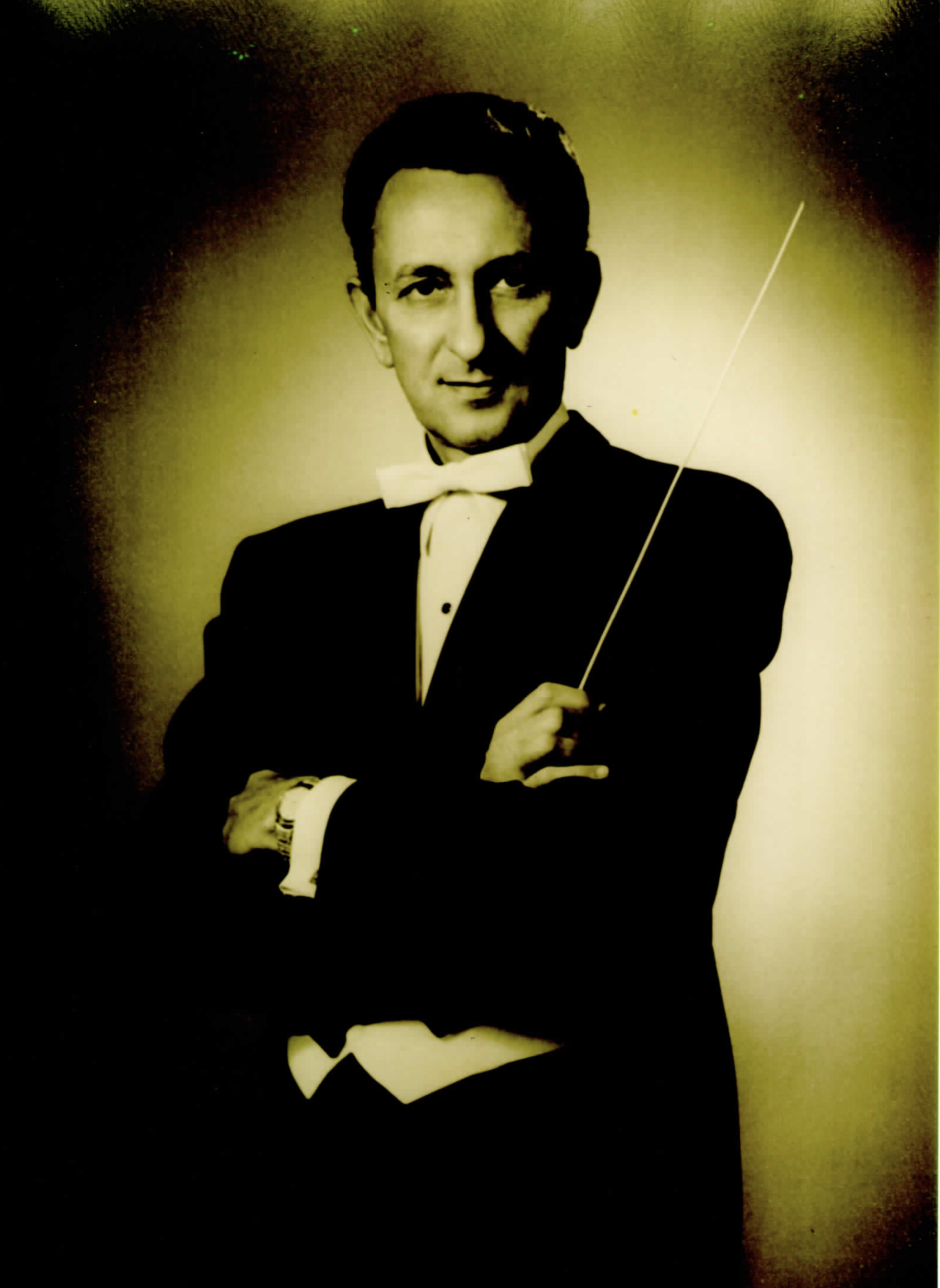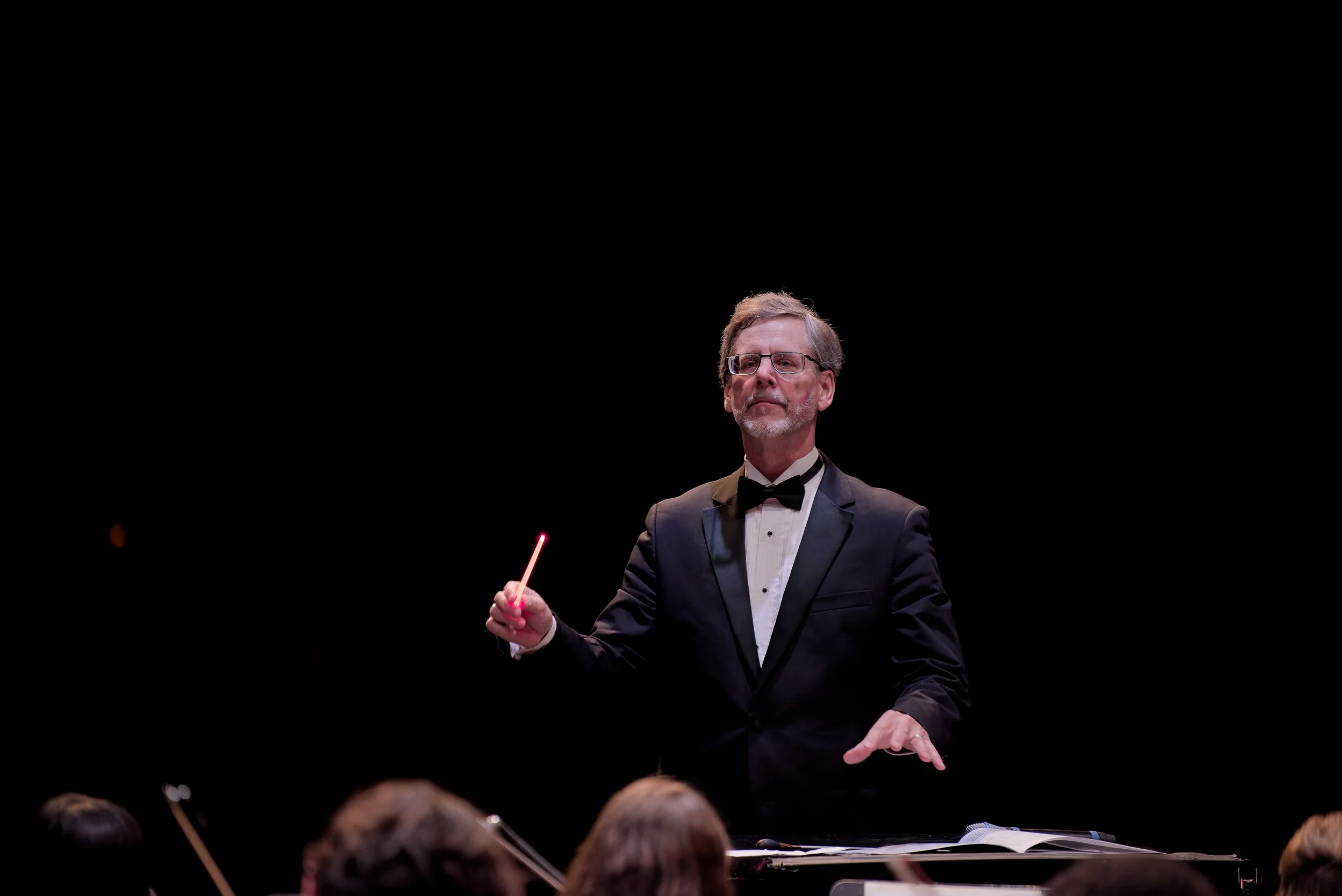Symphony Orchestra
Richard Wagner, Conductor

“All I ever wanted to do was conduct an orchestra”.
Dr. Decker, my orchestra professor at Wichita State University, would audition each wind player individually, and one Fall, after playing, I looked around his office and saw pictures and concert posters – all of him as a cellist. When I asked him why he didn’t play cello anymore, he said “all I ever wanted to do was conduct an orchestra”. At that point, I had never thought about conducting as something I might do, but a seed was planted.
Numerous times during my undergraduate years, it was suggested to me that I should conduct. I was a real classical music junkie from listening to records at home and being in a good high school orchestra and Youth Symphony in Wichita, KS. Many of my friends at Wichita State (including current Metropolitan Opera oboist and TYSO alumni Susan Spector) used to ask me about what we were playing next in orchestra and I could sing their parts to them. And I loved rehearsals! French horn players sit in the back of the orchestra, and from there, have a great vantage point to observe all of the instruments and conductors (like a catcher on a baseball field). I paid attention to what everyone was doing – and studied everything Dr. Decker would do during rehearsals to get things accomplished.
Later, in graduate school at Northwestern University, I took a conducting elective as part of my master’s degree in French horn and I heard it again – the teacher said after the class that I would “make a good conductor”. Moving to Tulsa (for my wife Lisa’s oboe position in the Tulsa Philharmonic), I taught horn at Quartz Mountain, where they asked me to organize - and conduct – a brass choir. It was scary, but great experience! I soon began a job teaching history and band at Bixby where I worked with young students and musicians every day.
In the Fall of 2002, I got a call from Mr. Ronald Wheeler asking me if I could help with rehearsals. When I arrived, he handed me the score to Wagner’s Prelude to “Die Meistersinger” and said, “you’ll be conducting this next week!” At age 40, I conducted an orchestra for the first time, and (after some initial jitters), found that, with all the years of music study, paying attention in rehearsal and working with young musicians, I had the confidence to keep coming back for more; and this Fall will be my 20th year working the tremendous young musicians in TYS.
Recently, one of my TU students asked me how I ended up working as a college teacher and I answered, “all I ever wanted to do was conduct an orchestra”. True story!
Richard Wagner is the Director of the School of Music, Director of Instrumental Ensembles, and Associate Professor of Music at The University of Tulsa. In this capacity, Professor Wagner conducts the TU Symphony Orchestra, TU Chamber Orchestra, and the TU Wind Ensemble. Additionally, he oversees the TU Concert and Athletic Bands and teaches classes in conducting, orchestration, music education, and French horn. He has been the conductor of the TU Symphony since 2005 and is also in his 20th year as a conductor of the Tulsa Youth Symphony. From 1994-2012, he was the Director of Instrumental Music in the Bixby (OK) Public Schools. Professor Wagner conducts regularly with the Signature Symphony at TCC and is active as an adjudicator and clinician in the area, region and nationally. For many years, he has been active as a hornist in groups such as the Tulsa Philharmonic, Tulsa Opera, Signature Symphony, OKC Philharmonic, Wichita Symphony, the Denver Brass, and the Aries Brass Quintet.
Professor Wagner has been a faculty member at Oklahoma State University, the Oklahoma Summer Arts Institute at Quartz Mountain and is the Director of the TU Summer Band Camp held each June on the TU campus. He holds degrees/certificates from Wichita State University, Northwestern University (IL), The University of Tulsa and has done doctoral work at the University of Colorado, Boulder. Professor Wagner is currently the Past-President of the South Central Division and a member of the National Executive Board of the College Orchestra Directors Association (CODA).
Concert Orchestra
Earl “Pete” Peterson, Conductor

Earl “Pete” Peterson is the Conductor of the Tulsa Youth Symphony’s Concert Orchestra.
I enjoy working with the talented musicians in the concert orchestra every Sunday, as I have since 2006. Their hard work, dedication, and desire to achieve excellence is inspiring. From the beginning of the season to the first concert, the musical and technical progress achieved by these musicians is very impressive. My wife, Laura, and I have been married over 35 years. Before retiring to gardening, Laura worked in the Tulsa Youth Symphony office for six years as the Communications Director. Laura and I have two wonderful daughters, Hayley and Chelsea; a great son-in-law, Matthew; and a little 3-year old grandson, Oliver, who delights us more than we thought possible. Oliver loves conducting and will be making his public debut very soon I hope. Chelsea, a violist, attended college as a Biology major and Hayley, a violinist, attended college as a Speech Language Pathology major. Both daughters fondly remember their time as members of Tulsa Youth Symphony. Both continue to have a passion for music and play in the TCC Community Orchestra—which I conduct—and are members of the Tulsa Quartet.
I attribute my desire to teach and conduct to my father, a retired junior high band director, and my high school band director. The influence of these two conductors combined with taking private cello lessons with one of Baltimore Symphony’s finest, helped to shape my professional life. I am pleased my career combines a beautiful blend of some of my favorite things: conducting, teaching, and performing.
Mr. Peterson enjoyed a 35-year teaching career with the Union Public Schools, where he started the string program in 1981. Starting with a few 6th grade orchestra pioneers, the program grew to over 700 string players in grades 6-12 when Peterson retired to focus on conducting and performance. He has directed many local youth orchestras, festival orchestras, and has guest-conducted Signature Symphony, and numerous All-District and Honors orchestras.
Peterson has served as cellist with the Gettysburg Symphony, Tulsa Philharmonic, Tulsa Opera, Tulsa Ballet, and Signature Symphony. He is currently a member of the Tulsa Symphony Orchestra, the Mosaic Trio and the Tulsa Quartet.
Peterson holds a Master of Music degree in Cello Performance from the University of Tulsa which he completed after earning a degree in Music Education from Towson State University in Maryland.
Micah Neely, Associate Conductor

Micah Neely is the SO Assistant Conductor for the Tulsa Youth Symphony and in his third year on staff. He is a TYS alumnus, and graduated from the University of Tulsa (cum laude) with a Bachelor of Arts in Viola Performance. Outside of TYS, Neely is an orchestra director at Jenks Public Schools, directing Jenks West Intermediate orchestras, and assisting at Jenks East Intermediate and Jenks Middle School. He is an active violist and performs regularly with the Signature Symphony and Symphony of Northwest Arkansas, as well as local groups.
Preparatory Orchestra
Wes Atkinson, Conductor

Wes Atkinson has conducted orchestras and bands in the Tulsa area for 15 years. He has taught orchestra in Tulsa, Broken Arrow, and Jenks Public Schools. He is currently the Orchestra Director at Jenks High School. Over the years, he has led middle school honors orchestras in both Broken Arrow and Jenks. He holds a Bachelor’s degree in Music Performance and a Master’s degree in Music Education.
Mr. Atkinson is also a composer and bassist, a member of ASTA and OkMEA, and a proud father of four daughters and is passionate about creating a culture where student musicians build character, find community, and achieve new musical heights.
former conductors
Amelia Ivory, Preparatory Orchestra Conductor
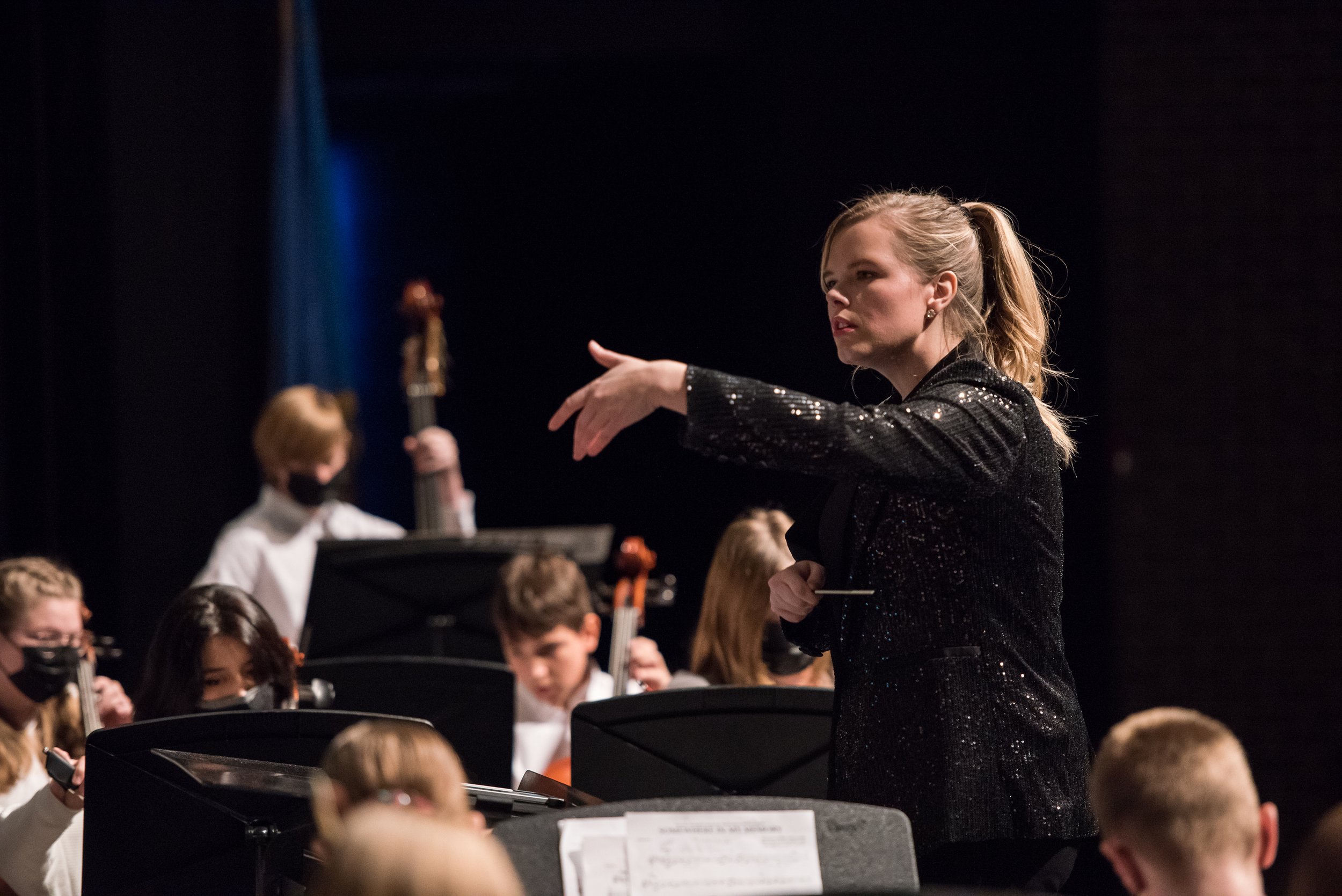
Amelia Ivory is the Tulsa Youth Symphony's Programs Coordinator ands Preparatory Orchestra Conductor. She is delighted to welcome all the young and enthusiastic musicians to the program. These budding and eager young musicians are tremendous to work with. Witnessing them absorb new techniques and styles so quickly continues to amaze her. She is inspired by their ability to learn and improve at such a quick pace. Their accelerated grasp of the material has given her the confidence to have these young musicians take on more challenging repertoire.
Ms. Ivory moved to Bartlesville, OK with her family at the age of 10 from Salt Lake City, UT where she had a small amount of experience playing violin through the school’s violin program. In 6th Grade, she joined the orchestra under the direction of Mary Snider and was easily persuaded to switch to the cello. As a student, she got involved in as many orchestral opportunities as she could, including the OMEA All-State Orchestra, the Oklahoma Summer Arts Institute Orchestra, the Bartlesville Symphony Orchestra, and, of course, the Tulsa Youth Symphony. These opportunities and her passion for music were the main driving force in becoming an Orchestra Director and sharing the experiences she loved so much with others. After a semester of student teaching at Union Public Schools under Pete Peterson, she received her Bachelor of Music Education degree from the University of Tulsa in 2009. Ms. Ivory was selected as a faculty member of the Union Public Schools Orchestra program in the Fall of 2009, specializing in middle school-aged groups.
Currently, she can be found performing with the Symphony of Northwest Arkansas and the Tulsa Signature Symphony and working on faculty of the University of Tulsa's Chamber Music Summer Camp. She also plays as a freelance artist and maintains a private cello studio. In her free time, Ms. Ivory enjoys traveling around the world and spending time with her parents, Russell and Marilyn, who recently moved to Albany, NY. She also enjoys spending time with her nephew, Killian, her sister, Alicia, and brother-in-law, Brent who live in the Oklahoma City metro area. Ms. Ivory loves adventure and has an unquenchable thirst for experiencing all that this world has to offer as well as making memories that she can take with her always.
Kenneth Baird, Concert Orchestra Co-Conductor

Kenneth Baird is native Tulsan who has served as an Instrumental Music Director at virtually every level. Beginning his teaching career in the small Oklahoma town of Inola, he later joined Tulsa Public Schools where he served for 28 years as an orchestra and band instructor in elementary, middle, and high schools. Additionally, he served as the director of the wind ensemble and the university orchestra at Oral Roberts University. Most recently, Mr. Baird served as the Tulsa-area director for Oklahoma Homeschool Bands and Strings. Additionally, Mr. Baird has composed and arranged numerous works for string orchestra, solo instruments, and chamber ensembles, and much of his music can be found online at Sheet Music Plus and J W Pepper. He holds trumpet performance and instrumental music education degrees from the University of Tulsa, as well as a masters degree in the science of performing arts from Southern Oregon University (American Band College program). Mr. Baird is married to Janet, a long-time flute teacher in the Tulsa area and the Bairds have two adult children, one of whom was a violist with TYS. When not composing, teaching, or playing music, Mr. Baird enjoys casual hiking and an occasional board game.
Michael Nicholson, Preparatory Orchestra Co-Conductor

Conductor Emeritus
Ronald Wheeler, Tulsa Youth Symphony Orchestra Conductor
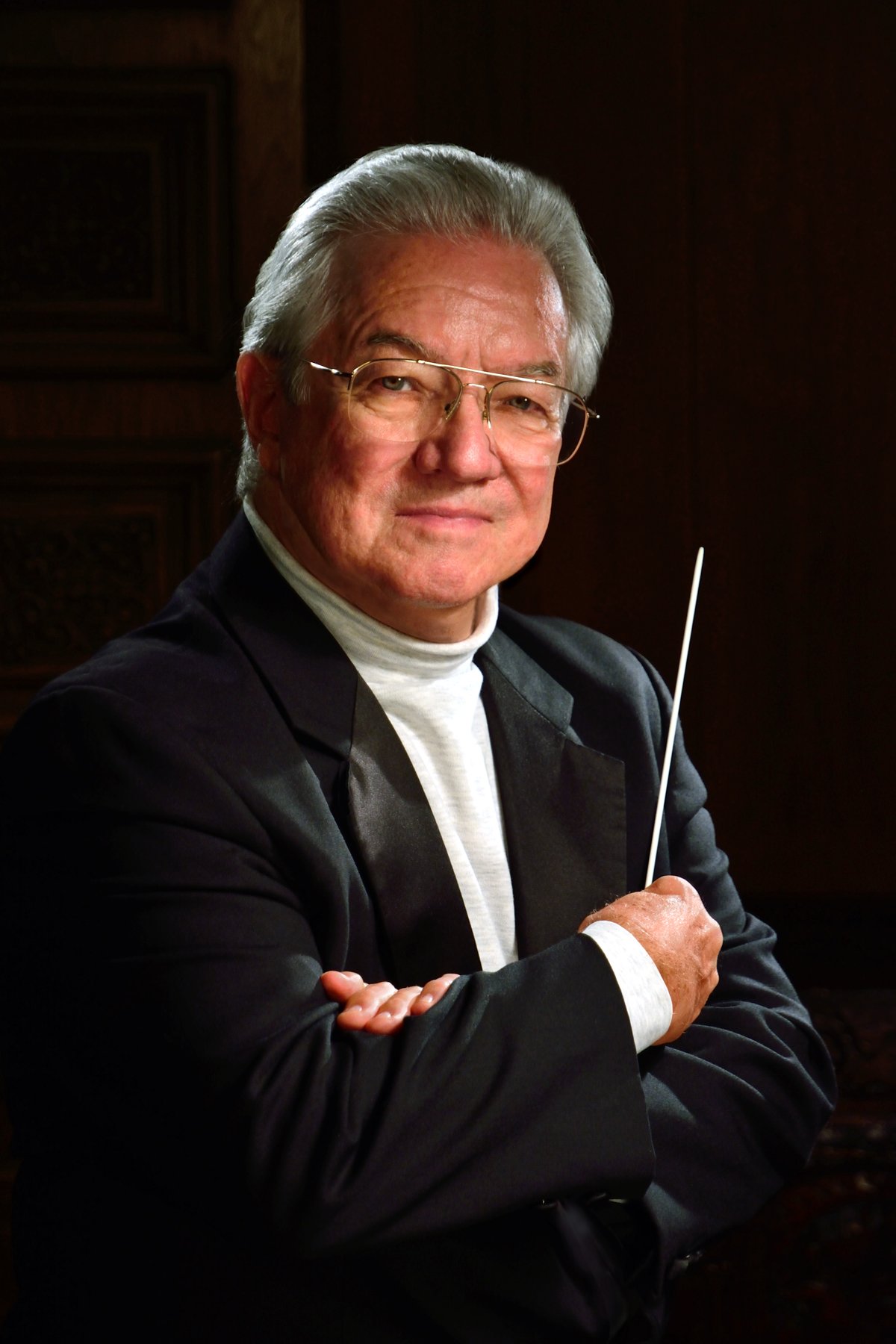
Ron Wheeler served as Conductor of the Tulsa Youth Symphony from 1972—2021. He was on the Oral Roberts University music faculty for fourteen years and has conducted at music camps and festivals in Oklahoma, Arkansas, Tennessee, California, Oregon and North Dakota. As a violinist, he has performed with the Tulsa Philharmonic and Tulsa Symphony Orchestra.
Mr. Wheeler has served in administrative capacities for the Tulsa Philharmonic, the Cascade Music Festival in Bend, Oregon and the Teton Music Festival in Jackson, Wyoming. He has also participated in conducting workshops sponsored by the American Symphony Orchestra League, and has served on the faculty of Tulsa Summer Arts, Oklahoma Summer Arts Institute at Quartz Mountain and Inspiration Point Fine Arts Colony in Arkansas.
Mr. Wheeler is an honorary member of Sigma Alpha Iota International Music Fraternity as a National Arts Associate. In January 2013, he was recipient of a Lifetime Achievement Award from the Oklahoma Music Educators Association.
Join us in honoring Mr. Wheeler with our first ever Conductor Emeritus recognition.
Robert McNally, Tulsa Youth Symphony Orchestra Conductor
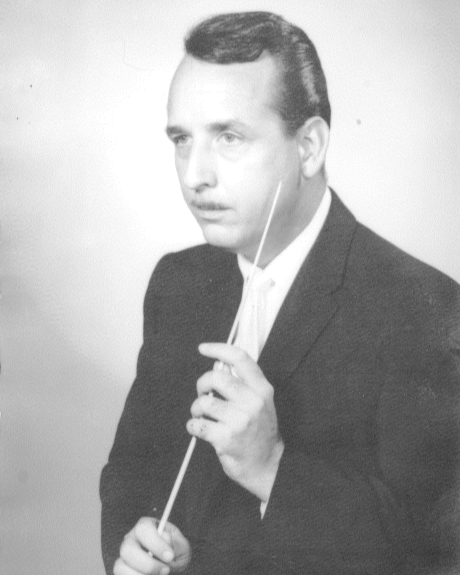
Max M. Waits, Tulsa Youth Symphony Orchestra Debut Conductor
